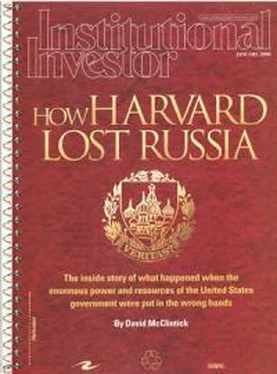RELEASED IN NOVEMBER 1996, the final report of the U.S. General Accounting Office could have been far worse for Harvard. Butler had done an excellent job of containing the auditors. The report's most severe criticism was that AID's management of HIID was "lax." "In particular," the report read, "USAID did not . . . set measurable goals and was not aware of decisions HIID was making that could have resulted in costs to the U.S. government or that could significantly affect U.S. strategy."
The HIID group was relieved. Shleifer arranged for the then-president of Harvard, Neil Rudenstine, to send a handwritten thank you note to Butler.
In Moscow the firms whose mutual fund applications were being thwarted were not taking the obstruction lightly. Pioneer's Frost demanded and got an audience with Hay. They met on Saturday, November 30, at the Starlite Diner but moved to a nearby French pastry shop for privacy.
Frost began by praising Hay for all the good he had done for Russia. It would be tragic, he said, if that record were tainted by scandal.
"There really is a problem here," Frost said. "If it isn't a real conflict of interest, there is a strong perception, an odor of conflict of interest. You need to make sure you are leaning over backwards to guard against this."
Frost later testified in the U.S. government lawsuit that Hay responded with threats, implying that he could make sure that Vasiliev and the RSEC further thwarted Pioneer's entry into the Russian mutual fund business: The application process could drag out and might not be approved. All of Pioneer's financial initiatives in Russia could be delayed.
"Is it fair to say you took Jonathan Hay's comments on November 30, 1996, as a threat?" Frost was asked under oath in his deposition.
"Yes."
"In your view, would any reasonable person in your position sitting at that meeting come away feeling that they had been threatened?"
"Yes. I think they would have felt threatened in terms of business, our ability to conduct business, yes."
Pallada continued to get special treatment from the Russian government and the Harvard project. In December, Hay and Vasiliev recommended to the U.S. Treasury that Pallada, along with such global powers as Citicorp and Salomon Brothers, be included in the coveted Capital Markets Forum. Hebert would sit on two panels alongside people far more prominent than she, including Citi CEO John Reed and Salomon CEO Deryck Maughan.
Despite her interest in committing $400,000 to Pallada and FRSD, Zimmerman still had invested nothing in Hebert's ventures. Then, as the end of the year neared, Butler gave her, Shleifer and Hay advice that made them squirm. He had decided a case could be made that her investment in Pallada was legitimate, but he said investing in the FRSD was "inadvisable." He recommended that the Shleifers disclose their plans to Vasiliev, to the Harvard general counsel's office and to Gregory Poppe, one of Harvard's attorneys.
According to exhibits entered in the lawsuit by the U.S., Zimmerman e-mailed Hay on December 2: "[Butler] would like us to tell Greg Poppe and just do it above board. He thinks . . . it should be done in an upfront way. I talked to Boss about this plan; he seemed less sure. . . ."
Hay replied: "I am just worried about what we do when Greg Poppe says no. I think that the issue must be prepared very carefully to minimize the risk that this happens. I also think we have to have a fallback if Poppe says no."
They decided to tell Poppe nothing.
Nielsen met with Shleifer in Cambridge on December 9. They lunched at the Harvard Faculty Club, speaking first about a range of issues and problems at HIID in Moscow. It wasn't until the next morning in Shleifer's office in the Littauer Center that Nielsen raised the concerns that had brought her to Boston.
"Jonathan and Beth are being stupid and arrogant about the registration issue," she said, according to her deposition in the lawsuit. "If they had quietly gone about getting [registration] No. 3 or 4, no one would even have noticed. But the fact that they felt they had to get No. 1 caused a huge sensation."
"I can't control who Jonathan sleeps with," Shleifer replied.
Nielsen was stunned, but continued. "I believe that Jonathan's direction of public funds to benefit a commercial private organization in which Hebert has an interest is a conflict of interest and an improper use of public funds."
Shleifer was unmoved. As Nielsen was leaving, he said, "I'm naming Jonathan executive director of the Resource Secretariat." Hay would be taking over from Bernard's replacement, Dmitri Subbotin, who was being pushed out because he had objected to the RSEC's registration of Pallada. The change would also make Hay Nielsen's direct boss.
Nearly a year after Hay and Hebert had begun seeing each other and three months after Butler had advised Hay to disclose the relationship to Vasiliev, Hay sent Vasiliev a letter, drafted by Butler, recusing himself from any oversight role concerning Pallada Asset Management. The letter was a formality -- Vasiliev had known of the relationship from the start. Hay's treatment of Pallada didn't change. He did finally move into Hebert's apartment, however, the plumbing at his own flat having long since failed.
When Hay and Hebert flew to Idaho for Christmas with Dr. Hay, they finally got around to documenting the emergency loan he had made to Zagachin in August. Zagachin would repay Hebert, who would repay Dr. Hay. In a promissory note Hebert pledged her personal assets, including a bank account in the Channel Islands and a 1991 blue Volvo 740.
In February, Shleifer wired $200,000 from his and Zimmerman's joint bank account to Pallada. He was implementing a cash advance from his wife to Hebert. The parties labeled the advance a loan, but it was not documented for the time being, leaving the option of structuring it as either debt or equity.
Meanwhile, Zimmerman sent First Russian Specialized Depository's latest business plan to AEW, which had indicated it would invest $50,000 in Pallada against an eventual total of $200,000 and would consider investing in FRSD as well.
AID had been stung by the General Accounting Office's finding that it had been lax in supervising Harvard's Russian Project, but did not take action for several months. In late February, Olga Stankova, a senior Moscow staffer of AID, privately informed Janet Ballantyne, the agency's mission director, that Hay's girlfriend "had been given unfair advantage in the registering of the first mutual fund program," according to Ballantyne's deposition in the lawsuit. Ballantyne, a 20-year AID veteran, was a smart bureaucrat, but she had only been in Moscow for three months and was still catching up with the agency's work in Russia, where 150 employees administered 80 to 90 programs. Though she had met with Hay on half a dozen occasions, she spent no more than 5 percent of her time on the Harvard program.
Upon hearing of the potential problem, Ballantyne summoned her top legal officer, Mark Ward, and then telephoned the agency's inspector general in Washington. The IG is independent of AID, appointed by the president of the U.S. and reporting directly to Congress. The IG immediately dispatched two special agents to Moscow to investigate. Ballantyne briefed the charge d'affaires and the Treasury attaché at the U.S. embassy in Moscow, who alerted ambassador Thomas Pickering.
The two agents conducted a quiet preliminary investigation over six weeks. On April 10, Ballantyne and Ward telephoned Jeffrey Sachs at Harvard; he had become HIID director two years earlier, but he had not been in Moscow since 1994, having been preoccupied with other projects around the world.
"Don't say anything," Ballantyne said. "We have a statement."
She informed him that AID's inspector general was investigating possible improprieties in the Harvard program in Moscow and that the agency was asking his cooperation in interviewing the staff. A stunned Sachs said he would get back to them.
Читать дальше






![Джонатан Димблби - Barbarossa - How Hitler Lost the War [calibre]](/books/385421/dzhonatan-dimblbi-barbarossa-how-hitler-lost-the-w-thumb.webp)





